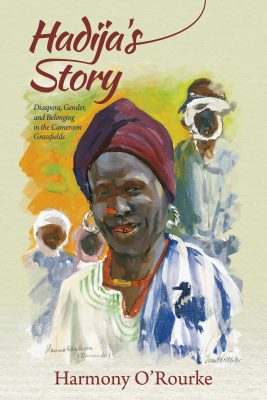 Claremont, Calif. (February 17, 2017)—Professor Harmony O’Rourke’s new book, Hadija’s Story: Diaspora, Gender, and Belonging in the Cameroon Grassfields, is the tale of one woman’s search for freedom and an exploration of the complex issues surrounding marriage, slavery and identity for Muslim Hausa migrants in Cameroon. O’Rourke is an associate professor of history at Pitzer College.
Claremont, Calif. (February 17, 2017)—Professor Harmony O’Rourke’s new book, Hadija’s Story: Diaspora, Gender, and Belonging in the Cameroon Grassfields, is the tale of one woman’s search for freedom and an exploration of the complex issues surrounding marriage, slavery and identity for Muslim Hausa migrants in Cameroon. O’Rourke is an associate professor of history at Pitzer College.
The story starts in 1952, when a widow named Hadija was charged with bigamy and tried in an Islamic courtroom in Cameroon’s Western high plateau region, also known as the Grassfields. O’Rourke, who is an associate professor of African history, recounts the court proceedings, which focused on the question of whether Hadija had been the wife or the slave-concubine of a wealthy Hausa merchant who traded cattle and cloth.
Likely in her teens when the merchant acquired her, Hadija traveled from Lere, Nigeria, to the Cameroon Grassfields, where she had to adapt to Hausa diaspora society. In telling Hadija’s story, O’Rourke examines issues facing women in this region involving personal prosperity, the continuation of generations and Islamic religious expectations in communities separated by vast distances.
“We often hear narratives about merchants or traders who bind themselves to local rulers through the exchange of women,” O’Rourke said. “Women are then seen as props in a story about the encounter between men from two different lands. My aim was to put women and their relationships at the center of the story and to examine history through that lens.”
O’Rourke came across Hadija’s story when she was in Cameroon doing fieldwork for her dissertation on the diaspora of the Hausa people, a large cultural and linguistic group in West Africa known for having immense trading networks. She was reviewing about 500 handwritten court cases, from the late 1940s to the early 1960s, in the archives of an Islamic—or Alkali—court when she discovered Hadija’s case. When writing her book, O’Rourke then examined this case alongside other court proceedings, oral histories, colonial documents, missionary records, paintings and photographs.
Elisha P. Renne, the author of Population and Progress in a Yoruba Town, calls Hadija’s Story “an original and important contribution.”
“(It is) an excellent example of how legal cases may be employed to provide evidence of the complicated contradictions of dominant social ideologies,” writes Renne, who is a professor of anthropology and Afroamerican and African studies at the University of Michigan.
 Harmony O’Rourke is an expert in gender, ethnicity, race, mobility, colonialism and Islam in nineteenth- and twentieth-century West Africa. Her courses examine world history, modern Africa, oral history, comparative slavery and histories of gender and sexuality. In 2016, she received an Arnold L. Graves and Lois S. Graves Award in the Humanities, which rewards outstanding teaching in the humanities by younger faculty members. O’Rourke received her PhD and MA from Harvard University and BA from Macalester College.
Harmony O’Rourke is an expert in gender, ethnicity, race, mobility, colonialism and Islam in nineteenth- and twentieth-century West Africa. Her courses examine world history, modern Africa, oral history, comparative slavery and histories of gender and sexuality. In 2016, she received an Arnold L. Graves and Lois S. Graves Award in the Humanities, which rewards outstanding teaching in the humanities by younger faculty members. O’Rourke received her PhD and MA from Harvard University and BA from Macalester College.
Hadija’s Story: Diaspora, Gender, and Belonging in the Cameroon Grassfields is available online from Indiana University Press and at national booksellers, including Indie Bound, Amazon and Barnes & Noble.